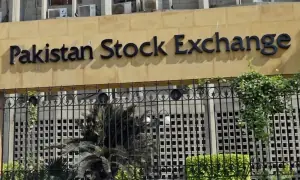StanChart profit swells on soaring global interest rates
2 min readHONG KONG: Standard Chartered PLC (StanChart) (STAN.L) on Wednesday said first-quarter pretax profit jumped 21%, beating expectations, as rising interest rates buoyed cash management income and retail product sales for the emerging markets-focused lender.
Chief Executive Bill Winters said he now expects income this year to grow around 10%, the top of a previously guided range.
The earnings update showed how rising central bank rates have boosted revenue, as StanChart charged borrowers more interest while not passing all of the increase to depositors.
StanChart, which earns most of its revenue in Asia, said January-March statutory pretax profit reached $1.81 billion. That compared with $1.49 billion a year earlier and the $1.43 billion average of 14 analyst estimates compiled by the bank.
It was StanChart’s largest single-quarter profit since the start of 2014 despite its biggest income earner - financial markets trading - seeing weaker activity compared with last year when markets experienced record volatility.
StanChart’s Hong Kong-listed shares rose as much as 1.4% to HK$61.90 versus 1.04% in the broader market .
The bank said income in its corporate cash management business tripled due to “strong pricing discipline and passthrough rate management”.
Retail banking income rose 53%, propelled by deposit income which also tripled to $771 million.
The robust earnings echoed resilience at U.S. banks which reported results earlier this month, as the sector weathered a global confidence crisis following the collapse of Silicon Valley Bank (SIVBV.UL) and Credit Suisse Group AG (CSGN.S).
European rival UBS Group AG (UBSG.S) on Tuesday said it would gird itself for the “hard” task of swallowing fallen compatriot Credit Suisse, which registered 61 billion Swiss francs ($68.49 billion) of asset outflows in the first quarter.
CHINA STABLE
Not all of StanChart’s update was positive, with expenses rising 5% due to inflation as well as hiring for strategic initiatives such as a push in China.
Credit impairment, a source of worry for bank investors in recent years as the global economy cools and runaway inflation pressures businesses, remained low at just $26 million versus $198 million in the same period a year earlier.
The bank said it saw signs of stabilisation in China’s troubled commercial real estate market, with no increase in credit impairment from the previous quarter as economic re-opening and support measures began to have an impact.
China’s policy direction has turned positive on real estate, “but the underlying economic activity and sales activity of the real estate projects is not yet back to where it was”, Deputy Chief Financial Officer Peter Burrill said at an industry conference last month.
For the latest news, follow us on Twitter @Aaj_Urdu. We are also on Facebook, Instagram and YouTube.

























Comments are closed on this story.